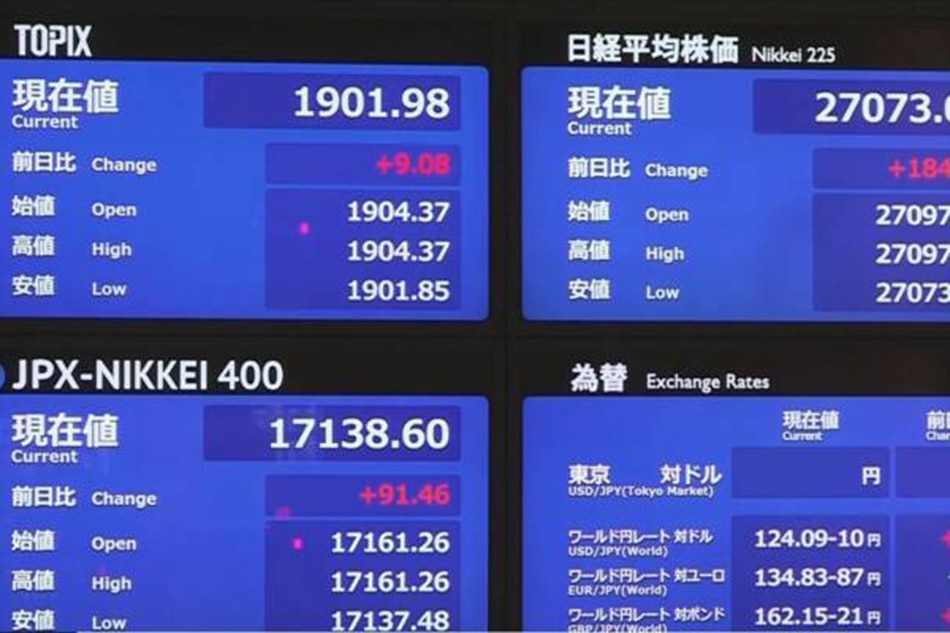 TOKYO – Tokyo stocks were lower Tuesday morning, with the Nikkei index briefly sinking over 2 percent after an overnight plunge on Wall Street and on concern over the global economic impact of China’s stringent COVID-19 restrictions.
TOKYO – Tokyo stocks were lower Tuesday morning, with the Nikkei index briefly sinking over 2 percent after an overnight plunge on Wall Street and on concern over the global economic impact of China’s stringent COVID-19 restrictions.
The 225-issue Nikkei Stock Average fell 244.81 points, or 0.93 percent, from Monday to 26,074.53.The broader Topix index was down 17.68 points, or 0.94 percent, at 1,860.71.
On the top-tier Prime Market, decliners were led by mining, marine transportation, and oil and coal product issues.
The U.S.dollar mostly traded in the lower 130 yen range in Tokyo after briefly falling to the upper 129 yen level following an overnight drop in U.S.Treasury yields, dealers said.
At noon, the dollar fetched 130.38-41 yen compared with 130.29-39 yen in New York and 131.20-21 yen in Tokyo at 5 p.m.Monday.
The euro was Quote: d at $1.0572-0574 and 137.85-88 yen against $1.0553-0563 and 137.45-55 yen in New York and $1.0511-0513 and 137.91-95 yen in Tokyo late Monday afternoon.
The Nikkei briefly fell below the 26,000 mark for the first time in about two months on an intraday basis, after the benchmark index plunged 2.53 percent the previous day to close at a two-month low.
The drop in Tokyo stocks came after Wall Street and other major markets in Europe suffered sharp falls overnight.The U.S.Dow Jones index closed at its lowest level in about 14 months and the tech-heavy Nasdaq index tanked over 4 percent.
Also pressuring the Japanese market was growing concern over the adverse impact of China’s “zero-COVID” policy following reports that restrictions have been tightened in some parts of the country, brokers said.
“The U.S.market dropped overnight on worries that tighter restrictions could lead to a decrease in demand in China and higher inflation due to disruptions on the global supply chain,” said Masahiro Yamaguchi, head of investment research at SMBC Trust Bank.
“While Tokyo markets tracked Wall Street lower, considering how the Japanese and Chinese economies are close, investors are worried about the adverse impact on Japanese companies,” he added.
The Nikkei index trimmed losses toward the end of the morning session as investors bought on dips as sentiment improved following a rise in U.S.
stock futures, brokers said.
Yamaguchi said that a speech by Russian President Vladimir Putin on Monday had little impact on the market because it did not contain a clear outlook on the conflict in Ukraine.
Market participants are focused on the U.S.consumer price index for April, a key gauge of inflation, due out Wednesday, as well as earnings reports by major Japanese companies to be released later in the week, brokers said.
Among Prime Market issues, declining issues outnumbered advancers 1,202 to 579, while 56 ended the morning unchanged.
Nikkei heavyweight Sony Group, which is set to release later in the day its earnings for the business year ended March, dropped 395 yen, or 3.6 percent, to 10,445 yen, on selling spurred by the steep decline in the Nasdaq index, brokers said.
Energy-related issues fell following an overnight drop in crude oil futures.Oil explorer Inpex dropped 124 yen, or 7.8 percent, to 1,474 yen and oil refiner Eneos Holdings was down 10.0 yen, or 2.1 percent, to 467.4 yen.
Bucking the negative trend, Canon rose 75 yen, or 2.5 percent, to 3,122 yen, after it said Monday it will buy back up to 50 billion yen ($384 million) worth of its shares.
US Fed makes biggest rate increase since 2000 to fight inflation Lower PSE open likely driven by global issues, not poll results: analyst .